The prospect of transformative “enhancement” of human abilities has tantalized and inspired invention and innovation through the ages.
How Pew Research Center approached this topic
The Center survey asked respondents a series of questions about three potential avenues for human enhancement:
- Robotic exoskeletons with built-in AI computer systems to help guide the device, making it possible to greatly increase a person’s strength and ability to lift heavy objects for manual labor jobs such as manufacturing or construction.
- Gene editing (changing the DNA of embryos before a baby is born) to greatly reduce a baby’s risk of developing serious diseases or health conditions over their lifetime.
- Computer chips surgically implanted in the brain, making it possible to far more quickly and accurately process information.
Other questions asked respondents about a range of goals for human enhancement, without specifying the techniques that would be used to achieve these changes.
This study builds on prior Center research including a survey on Americans’ views about the possibilities of radical life extension, a series of focus groups and a survey looking at public views about the possibility of enhanced health from gene editing for babies, for cognitive function from computer chip implants in the brain and for physical strength and stamina from transfusions with synthetic blood.
Human enhancement practices encompass a wide range of techniques to augment or improve people’s physical, mental and reproductive capabilities. Laser eye surgery, off-label use of drugs to improve concentration and mental agility, pacemakers, organ transplants, dietary supplements and wearable devices, such as smart watches or augmented reality glasses, are seen as tools and techniques in wide use today to enhance human capabilities.
Emerging techniques now in use or being tested are generally focused on addressing therapeutic needs, restoring a person’s abilities due to injury, disease or a health condition. Futurists have long pointed to the potential for such techniques to be used more broadly. The route to dramatic changes in human abilities is being fueled by the convergence of innovations in biotechnology, nanotechnology, information technology, artificial intelligence and other fields.
Pew Research Center’s study is focused on public attitudes about future-oriented options for human enhancement that would expand the boundaries of human abilities. These technologies are not currently in wide use but could ultimately hold far-ranging implications for humanity. The findings provide an early lens into public thinking and expectations about these developments. As such, they address some of the key ethical questions American society faces in deciding what changes to human abilities people would find acceptable or unacceptable – and why.
The goals of human enhancing technologies are generally met with more excitement than concern, particularly when it comes to improving health
One of the most important takeaways from the new Pew Research Center survey is the variety of reactions to potential changes to human abilities depending on their purpose or goal – with changes holding therapeutic potential widely embraced. Even for goals that are widely supported, however, certain circumstances under which these techniques might be used give people pause.
The Center asked survey respondents how they would feel about making changes in human abilities, without going into detail on how such changes would be achieved. Across this set of six, public excitement is generally higher than concern, although a notable share say they have an equal mix of both reactions.
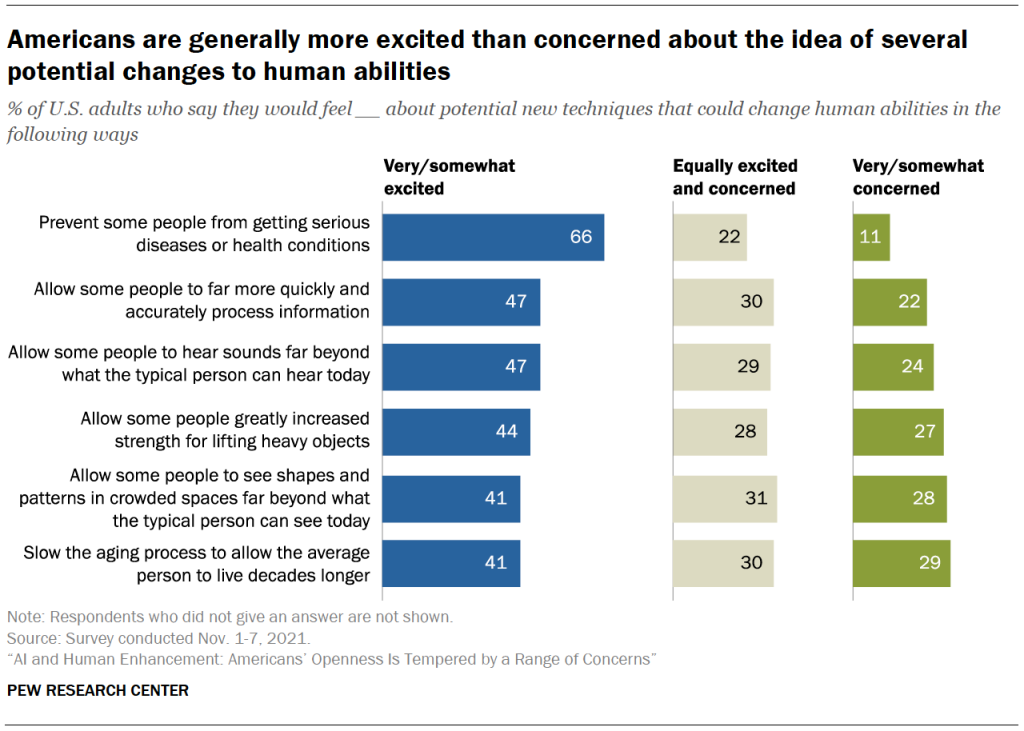
Two-thirds of U.S. adults say they would be at least somewhat excited about the possibility of changing human capabilities to prevent serious diseases or health conditions (including 41% who would be very excited). Just 11% say they would be at least somewhat concerned and 22% say they would be equally excited and concerned about this development.
Other possible enhancements draw more excitement than concern, but by narrower margins and with greater shares expressing an equal mix of both reactions. For instance:
- Cognitive enhancement: Nearly half of Americans (47%) say they would be at least somewhat excited about techniques that allow some people to “far more quickly and accurately process information.”
- Auditory enhancement: More Americans say they would be excited (47%) than concerned (24%) about techniques that allow some people “to hear sounds far beyond what a typical person can hear today.” About three-in-ten (29%) say they would respond to such developments with an equal mix of excitement and concern.
- Physical strength: Improvements to physical capabilities garner a similar response: 44% of Americans say they would be excited about new techniques that would allow some people greatly increased strength for lifting heavy objects, 27% say they would be concerned and 28% would have an equal mix of both reactions.
- Visual enhancement: 41% of Americans say they would be at least somewhat excited by developments that would enhance human vision, allowing some people to see shapes and patterns in crowded spaces to a degree far beyond what is typical today. A larger share say either that they are concerned by (28%) or that they have a mixed reaction to this possible enhancement (31%).
- Radical life extension: 41% say they would greet the possibility of a major change to the human lifespan with excitement, a concept called radical life extension because it would slow the aging process and allow the average person to live decades long. Three-in-ten say they would have an equal mix of positive and negative response to this prospect, and a similar share (29%) would primarily be concerned.
Men and those with higher levels of education are generally more supportive of these potential changes to human abilities. Younger adults, ages 18 to 29, stand out as generally more embracing than older age groups of these potential changes, particularly for the idea of enhancing physical strength and changing visual abilities. See details in Appendix.
Many Americans hesitant or undecided about the virtues of biomedical interventions to change cognitive abilities or the course of human health
To better understand the contours of public opinion about human enhancement, the Center survey also asked respondents to consider three possibilities in more detail. These future-oriented scenarios capture public expectations and reactions to promising technologies that could bring dramatic changes for cognitive abilities, human health and physical strength.
One high-profile option stems from developments in neurotechnology that would directly connect the brain to a computer interface. The survey includes a series of questions about the potential to augment people’s cognitive abilities, allowing them to far more quickly and accurately process information, by surgically implanting a computer chip in the brain.
A second technique, stemming from discoveries in biotechnology, focuses on the potential use of gene editing for babies in a way that could alter the trajectory of human experience with disease. While gene editing is increasingly used to address therapeutic needs today, in the future gene-editing techniques could change the DNA of an embryo in a way that greatly reduces a baby’s risk of developing serious diseases or health conditions over their lifetime.
A third approach to human enhancement featured in the survey is the potential use of wearable devices, in this case robotic exoskeletons to greatly increase strength for lifting in manual labor jobs. There are several types of robotic exoskeletons in use and in development today; the survey focused on devices with an integrated artificial intelligence computer system which uses sensor data to help guide its use.
While by no means exhaustive of the possibilities, these three scenarios underscore the variety of forms that human enhancement can take.
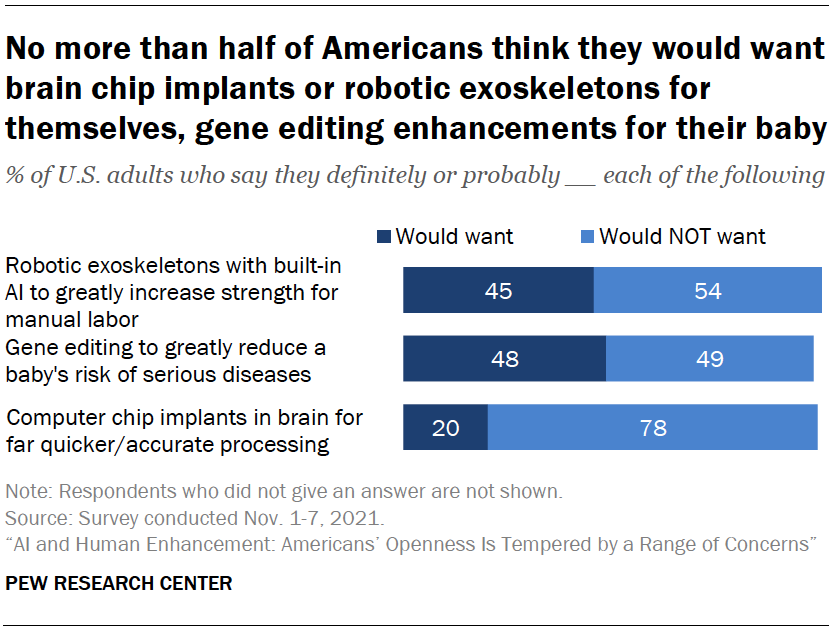
No more than about half of Americans say they, personally, would want any of these potential enhancements for themselves or for their baby.
Nearly eight-in-ten (78%) say they would opt against computer chip implants to enhance cognitive functioning for themselves. And 49% of Americans think they would be disinclined to have gene editing for their own baby to greatly reduce their chances of developing serious diseases or health conditions.
Even so, many Americans foresee a world where most people would feel social pressure to get these enhancements should they become widespread. Six-in-ten Americans say that most people would feel pressure to get a brain chip implant to augment cognitive function should implanted devices of this sort become widespread. Nearly three-quarters (73%) of the public believes most parents would feel pressure to get gene editing for their baby if such techniques to greatly reduce a baby’s risk for serious diseases or other conditions became widespread (as do 68% of those with a child under age 18 at home).
While people make important distinctions among these future enhancement techniques, no more than a third say any of the three would be a “good idea for society.” The remainder express caution or are uncertain of their views. People are especially negative about the potential use of brain chip implants to augment cognitive function. Many more say this is a bad idea than a good one for society (56% vs. 13%). Still, some three-in-ten (31%) do not take a stand on this matter.
One factor connected with the predominantly hesitant reactions Americans bring to these possibilities is skepticism about whether each would bring broad-scale improvements for people.
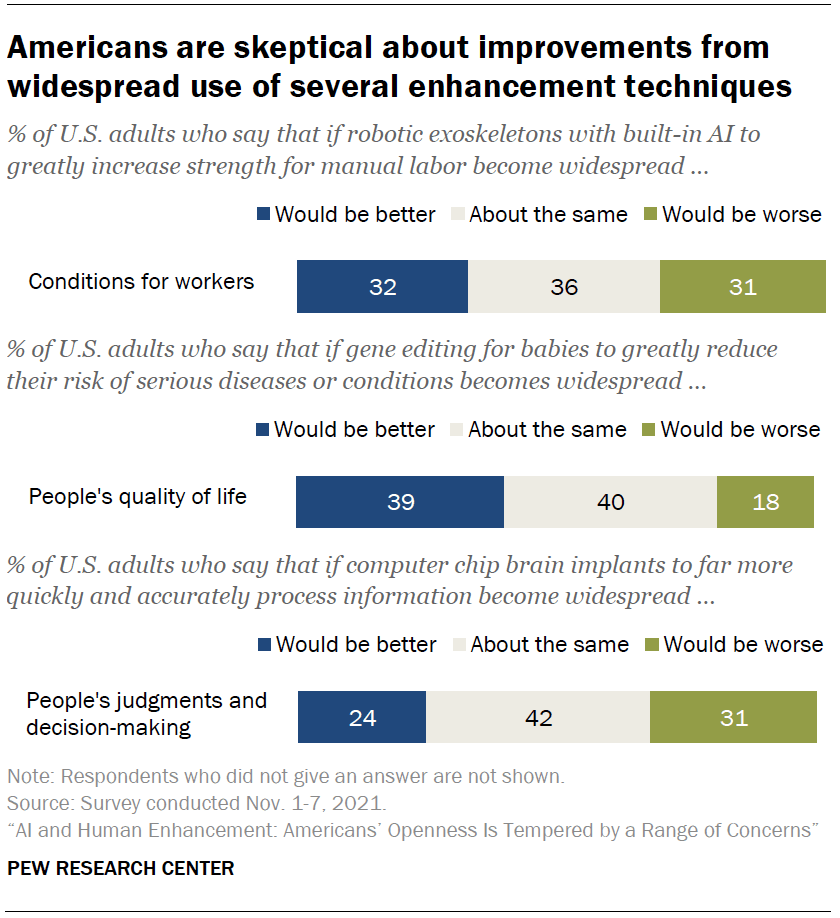
About four-in-ten Americans (39%) foresee a future in which widespread use of gene editing to greatly reduce a baby’s risk of serious diseases or conditions would make people’s overall quality of life better; a majority says people’s quality of life would be roughly the same (40%) or worse (18%), overall.
Roughly a third of Americans (32%) think the widespread use of robotic exoskeletons with built-in AI to greatly increase strength for manual labor would lead to better working conditions. The remainder are closely divided between whether working conditions would be about the same (36%) or worse (31%) as a result.
Americans are particularly skeptical that the widespread use of a computer chip implant in the brain to increase the speed and accuracy of cognitive processing would lead to improvements in people’s judgment and decision-making; 24% say it would, while 42% say judgment quality would be no different and 31% say it would be worse.
People’s familiarity with developments in cognitive and physical enhancement remains limited
One factor in public attitudes around human enhancement could be simply that these are new ideas and remain largely unfamiliar ones for a majority of Americans.
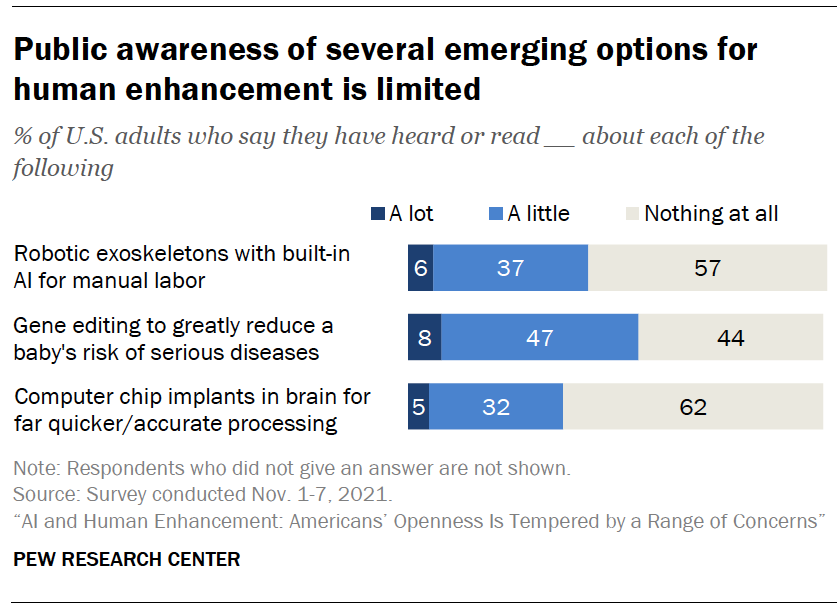
No more than one-in-ten U.S. adults say they have heard or read “a lot” about any of the three concepts asked about in the survey.
Comparisons with a 2016 Center survey, though based on slightly different descriptions of these ideas, suggest that public awareness of brain chip implants and gene editing to greatly reduce the risk of serious diseases or health conditions has not grown substantially over the past five years.
Familiarity is a strong factor in Americans’ views about the use of robotic exoskeletons with built-in AI, and it is at least modestly associated with views of gene editing and brain chip implants. For example, those who have heard or read at least a little about robotic exoskeletons with built-in AI are largely of the mind that their widespread use would be a good (48%) rather than a bad (23%) thing for society. In contrast, people who have heard nothing about such exoskeletons are closely divided over their potential effect (22% say this would be good, 26% say bad) and many are uncertain (52%).
These findings are in line with a common argument that public reception for new scientific and technological developments is often cautious simply because of their newness. Advocates often posit that as people’s familiarity with these developments increases, so too does public acceptance of them. It’s not clear that this is always the case, however. History suggests that the link between familiarity and public response can go in either a positive or negative direction.
The Center survey includes at least one notable case in point. The use of algorithms by social media companies to detect false information posted on their sites is now at least modestly familiar to a majority of Americans. Still, among the roughly one-in-four people who say they know a lot about these algorithms, more say they represent a bad (47%) rather than a good idea for society (40%). People with “a little” awareness of such computer programs lean positive, as do those who say they have heard or read nothing about these kinds of computer programs.
Half or more express concern that brain chip implants to process more quickly, gene editing to prevent disease would be meddling with nature
One of the key ethical questions about scientific and technological breakthroughs to enhance the mind and body concerns whether Americans see such developments as moving beyond limits set by God, nature or reason. To capture a sense of this, the Center asked people whether they saw each possibility as a change in line with other ways humans have tried to better ourselves over time or if, instead, it would be “crossing a line” we should not cross and meddling with nature.
Concern about the use of brain chip implants is particularly strong by this measure: 63% of Americans say that if implanting computer chips to speed up information processing becomes widespread, they would feel it was “meddling with nature.” Fewer (35%) take the position that this would be in line with ways humans have tried to better ourselves over the millennia.
Americans lean in the same direction in thinking about the potential widespread use of gene editing for babies to greatly reduce their risk for serious diseases: 52% say they would see this as crossing a line we should not cross; 46% say this would be no different than other ways humans have tried to better ourselves over time.
Views of robotic exoskeletons with a built-in AI system tilt in the opposite direction. A 62% majority of Americans say the widespread use of such robotic exoskeletons would be no different than other ways humans have tried to better ourselves over time.
Americans with higher levels of religious commitment are especially likely to see all three potential options to change human abilities as something that would be meddling with nature.
For instance, about eight-in-ten adults high in religious commitment (81%) say the widespread use of brain chip implants to improve cognitive processing of information would be meddling with nature and crossing a line we should not cross. Half of those low in religious commitment agree. (Levels of religious commitment are based on the importance or salience of religion in a person’s life and their frequency of prayer and attendance at religious services.)
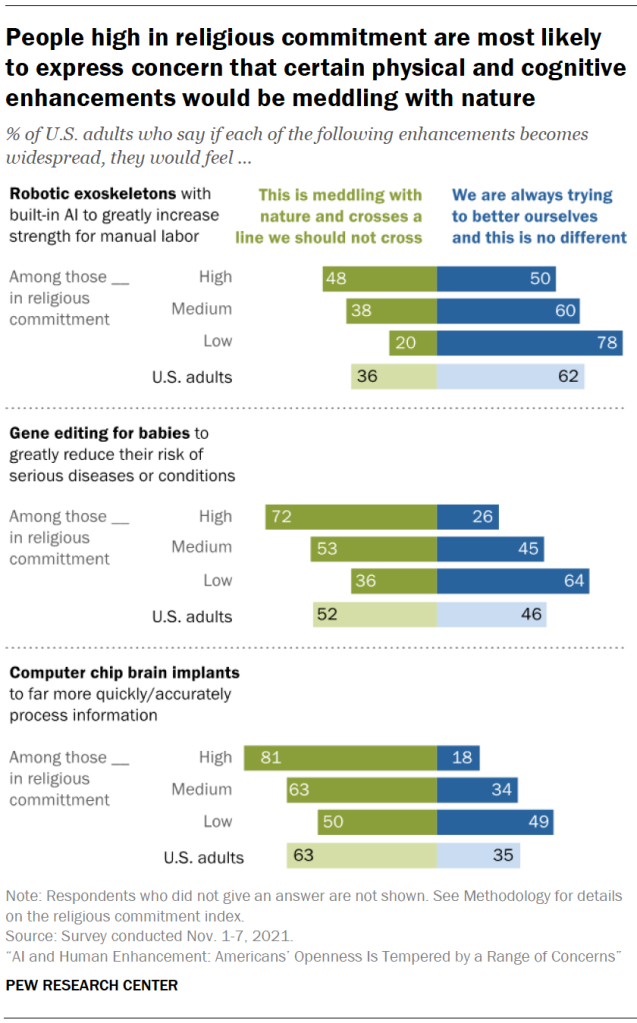
Similarly, those high in religious commitment are far more likely to see the potential use of gene editing for babies for enhancement purposes as something what would be meddling with nature and crossing a line we should not cross (72% vs. 26% who say it would not differ from other forms of self-improvement).
The 2016 Center survey looking at potential enhancements from brain chip implants and gene editing also found wide differences in views about this issue across levels of religious commitment.
Religious differences arise in a range of views about these three potential enhancements in the new survey. For example, people high in religious commitment are far less likely to say they would personally want to use a robotic exoskeleton (36% say this, vs. 59% of those low in religious commitment).
Across the six potential goals for human enhancement mentioned in the survey, people high in religious commitment are about 15 to 20 percentage points less inclined to say they would be very or somewhat excited about the prospect. See the Appendix for details.
People would be more open to technological enhancements in human abilities if ways to limit scope, increase human agency were in place
Even while Americans’ views about three proposed avenues for human enhancement often strike a cautious note, majorities see promise for each if mitigating steps were in place that increased human agency over the nature of these changes.
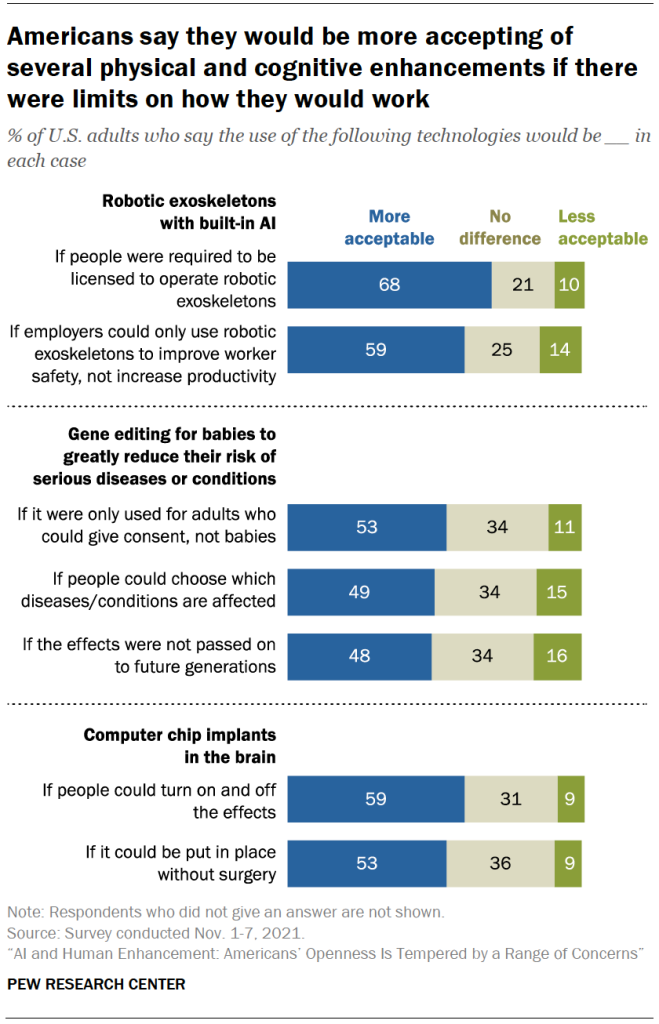
One potential avenue for cognitive enhancement – brain chip implants – was met with a collective wariness. Yet, a majority of Americans say that brain chip implants would be more acceptable to them if people could turn on and off the effects (59%) and if implanting the devices did not require surgery (53%).
Similar patterns emerge as people think about the potential use of gene editing for babies. The need for such genetic modifications to be done on an embryo, and thus based on the consent of parents acting on behalf of a child, can raise additional ethical as well as legal concerns. Roughly half of U.S. adults say gene editing to prevent the risk of serious diseases or conditions would be more acceptable if it were used only for adults, who could give consent to the procedure (53%).
About half (49%) of the public says gene editing for babies that allowed people to choose which diseases or conditions are affected would be more acceptable. A similar share (48%) says such gene editing would be more acceptable if it would not be passed on to future generations.
Scientists who specialize in genome-editing technology have long raised the alarm about the potential uses of these technologies in ways that could change the human gene pool, known as germline editing. An alternative, of less concern to bioethicists, involves genetic modification only in somatic cells, that would not be passed on to future offspring.
On the idea of robotic exoskeletons – external devices that could be removed – the public is more accepting when given the option of having restrictions in place for how and when they could be used. For example, two-thirds (68%) of Americans say that robotic exoskeletons with built-in AI systems would be more acceptable if licensing for appropriate use of these devices were required. And 59% say that limits on how employers could use these devices for manual labor jobs, specifically if they were used to enhance worker safety rather than increase worker productivity, would make them more acceptable.
Americans are open to each of three potentially enhancing techniques for uses focused on addressing disease or physical, cognitive limitations
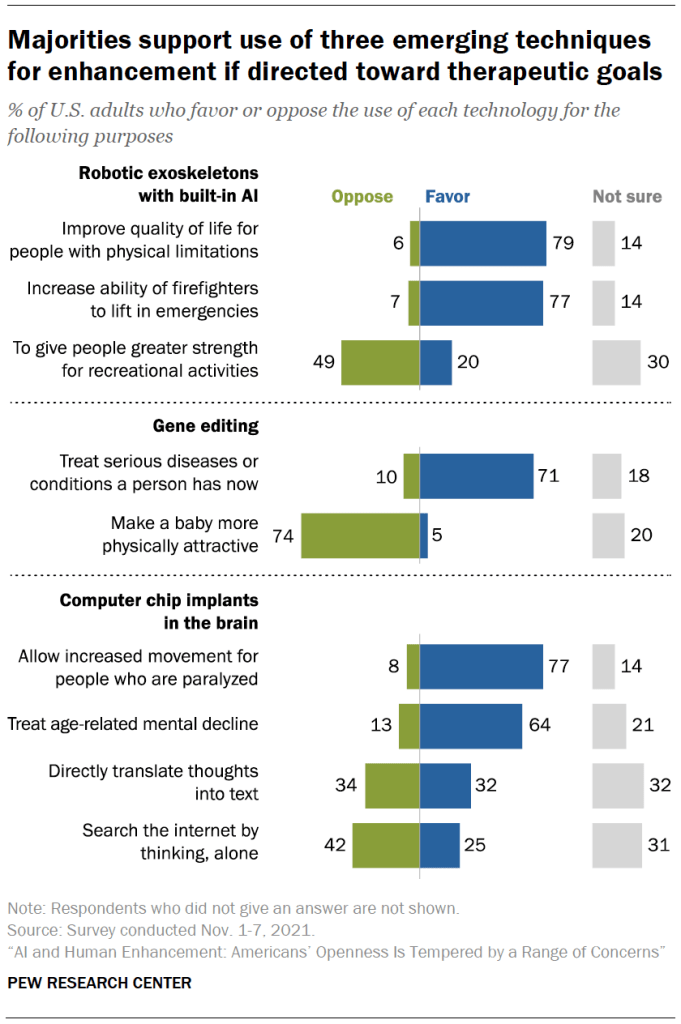
People make clear distinctions among goals behind the possible uses of three proposed techniques to alter human abilities.
Asked to consider the potential use of robotic exoskeletons, genetic modifications, and brain chip implants for a range of purposes, majorities of U.S. adults embrace these techniques when they would be aimed at helping people with physical, health or cognitive limitations.
Consider the following:
- 79% favor the use of robotic exoskeletons with built-in AI systems to improve the quality of life for people with physical limitations.
- 77% favor the use of computer chip implants in the brain to allow increased movement for people who are paralyzed.
- 71% favor using gene editing in order to treat diseases or health conditions a person is currently experiencing.
But there are clear limits to public support around these techniques. About three-quarters of Americans (74%) oppose the potential use of gene editing to enhance a baby’s physical attractiveness. While many experts forecast a future where robotic exoskeletons are commonplace in people’s everyday fitness routines, roughly half of the public (49%) opposes the idea of using a robotic exoskeleton to give people increased strength for recreational activities.
And the potential use of computer chip implants to “read people’s minds” – allowing them to search the internet solely by thinking – elicits more opposition than support, with 31% uncertain of their views about this possibility.




